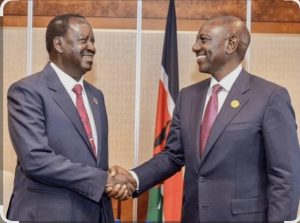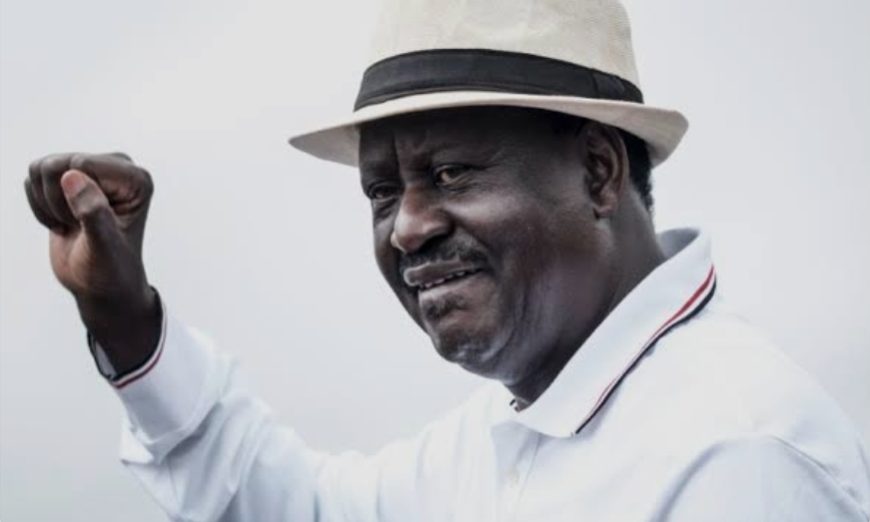WHEN Kenya was engulfed in President Daniel arap Moi’s dictatorship, the country needed Raila Odinga to counter it with his blood and life. When the Kenya African National Union (KANU) held its firmest grip on power, it was Raila’s unlikely handshake with Moi that helped dismantle that dominance. His courage, vision, and sense of political timing saved Kenya from the jaws of one-party rule.
Raila played a vital part in the return to multiparty democracy in Kenya. But it was his political pragmatism after the handshake with Moi that achieved one decisive thing: the fall of KANU.
Having joined KANU from his party, then defecting from the ruling party, Raila went on to lead a coalition movement that unseated KANU in the 2002 general election. His powerful declaration – “Kibaki Tosha” – (Kibaki suffices) united the opposition and gave Mwai Kibaki a resounding victory as Kenya’s first president under the new multiparty era.
When Kenya later needed a new constitution, it was Raila who stood at the forefront, mobilising citizens through years of struggle until the 2010 Constitution was born.
And when the country stood on the brink of chaos – after disputed elections and deep political division – it was again Raila who offered an olive branch, even to his fiercest rivals, to save the nation from bloodshed.
He ran for president five times and, despite not winning, his efforts have never been in vain. Each attempt represented more than just a quest for power – it was a testament to his unwavering commitment to democracy, justice, and the will of the people.
His campaigns have consistently challenged the status quo, exposed flaws in electoral systems, and inspired millions across generations to believe in the power of civic participation and reform.
Beyond the ballot box, Raila’s persistence and resilience have shaped Kenya’s political landscape in profound ways. His struggles have brought about crucial constitutional, institutional, and social changes that continue to strengthen the nation’s democratic foundations.
In many ways, his legacy transcends victory or defeat; it lies in his enduring fight for a more transparent, inclusive, and accountable Kenya.
For over four decades, Raila Odinga was more than a politician. He was Kenya’s conscience, a unifying figure who understood that leadership is not only about winning elections but about preserving the nation’s soul. And indeed, his life holds timeless lessons for Tanzania’s opposition and for East Africa as a whole.
The handshakes that shaped a nation
Few African politicians have shown such skill in turning political rivalry into opportunity for reform. In his lifetime, Raila shook hands with four presidents – each handshake marking a turning point in Kenya’s democracy journey.
His first was with President Daniel arap Moi, his former jailer. That handshake marked reconciliation after years of imprisonment and political persecution. It symbolised Raila’s belief that national healing requires magnanimity.
But it also revealed his strategic brilliance. He used that reconciliation to gather reform forces from within KANU and later defected to form the National Rainbow Coalition (NARC), which brought down the ruling party that had governed Kenya for four decades.
The second was with President Mwai Kibaki, after the 2007 post-election violence. The two rivals agreed to form a coalition government that ended bloodshed and laid the groundwork for far-reaching constitutional reforms.
Raila became Prime Minister in that government – a position that allowed him to push through crucial institutional changes that strengthened Kenya’s democracy.
The third was his historic handshake with President Uhuru Kenyatta in 2018. After yet another divisive election, Raila chose national peace over personal political gain. That handshake calmed tensions, restored dialogue, and gave Kenya a chance to heal. It also reminded the continent that opposition can be patriotic without surrendering its principles.
Finally, his cordial engagement with President William Ruto reflected his enduring belief in political dialogue. Even as an opposition leader in his twilight years, Raila continued to call for engagement on electoral reforms and national unity – never losing sight of Kenya’s democratic future.
Each handshake carried a purpose – reconciliation, reform, or renewal – and each left Kenya better than before. And this was part of his advice to Tanzania’s new opposition leaders – Tundu Lissu, John Heche and Godbless Lema – when they paid a courtesy visit to him early this year: fight and engage.

The philosopher of pragmatic politics
Raila Odinga was both an idealist and a pragmatist. He fought fiercely for democracy but never allowed bitterness to cloud his vision. He knew that political power was temporary; but national unity was eternal.
His politics was guided by conviction, not convenience. He understood that opposition is not an act of rebellion against the state, but a service to the people – a watchdog role that ensures governments remain accountable.
This balance between confrontation and cooperation is the hallmark of statesmanship, and it is what kept Kenya’s democracy alive when it could have collapsed.
Lessons for Tanzania’s opposition
Persistence pays.
Raila endured detention, exile, betrayal, and multiple electoral defeats; but never quit. Tanzanian opposition leaders must draw strength from this. The fight for democracy is a lifetime struggle; as, like freedom, there is no time we are going to say there is enough of it.
Unity is strength.
The “Kibaki Tosha” moment showed that unity, not ego, wins battles. Tanzania’s opposition must learn to close ranks, build coalitions, and put the country before self. A divided opposition only perpetuates authoritarianism.
Dialogue is neither defeat nor betrayal.
Raila’s handshakes were not betrayals; they were tools for peace and reform. Tanzanian opposition must learn when to negotiate and when to resist – without compromising core principles. At least, he gave them this lesson face-to-face.
Movements outlive parties
Raila built a democratic movement, not just a party. Tanzania’s opposition should link political reform to citizens’ everyday struggles; so that democracy becomes relevant to people’s lives. And opposition parties should learn the art of working together.
Moral authority matters
Raila’s life gave him unmatched credibility. His sacrifices earned trust. Tanzanian leaders, even those in political office, need to build and rebuild that moral connection with citizens through integrity and service, not rhetoric alone.
The East African legacy
Raila Odinga’s life was a lesson in leadership for the entire region. He proved that opposition can coexist with patriotism; that peace can coexist with defiance, and that engagement can achieve what violence cannot.
In an era when many opposition movements in East Africa face repression and disillusionment, Raila’s story is a reminder that democracy is nurtured not by perfect elections but by persistent people. His handshakes were not acts of surrender. They were acts of survival, of keeping democracy alive when it was most at risk.
Kenyans affectionately call Raila Odinga, “Baba” – a Kiswahili title for “Father” as a sign of respect and recognition of his long-standing role in the country’s political struggle. The title symbolizes his position as a father figure in Kenya’s fight for democracy, multi-party politics, and social justice.
Many Kenyans, especially his supporters, see him as a symbol of resilience and leadership; someone who has “fathered” the modern democratic movement in Kenya.
It is not just about age or seniority. It reflects a deep sense of admiration, emotional connection, and recognition of his sacrifices for the nation.
Raila Odinga’s death marks the end of an era, but not of the ideals he championed. He was the statesman who used his “blood and life” to steer Kenya from dictatorship to democracy, from division to dialogue, from despair to reform.
For Tanzania’s opposition – and East Africa’s reformers – Raila Odinga’s legacy is both a challenge and an inspiration to persist in the face of repression; to unite in pursuit of freedom, and to believe that political maturity sometimes means shaking the hand of your adversary for the greater good.
He was, indeed, the blessing East Africa had; and his lessons will definitely outlive him.










